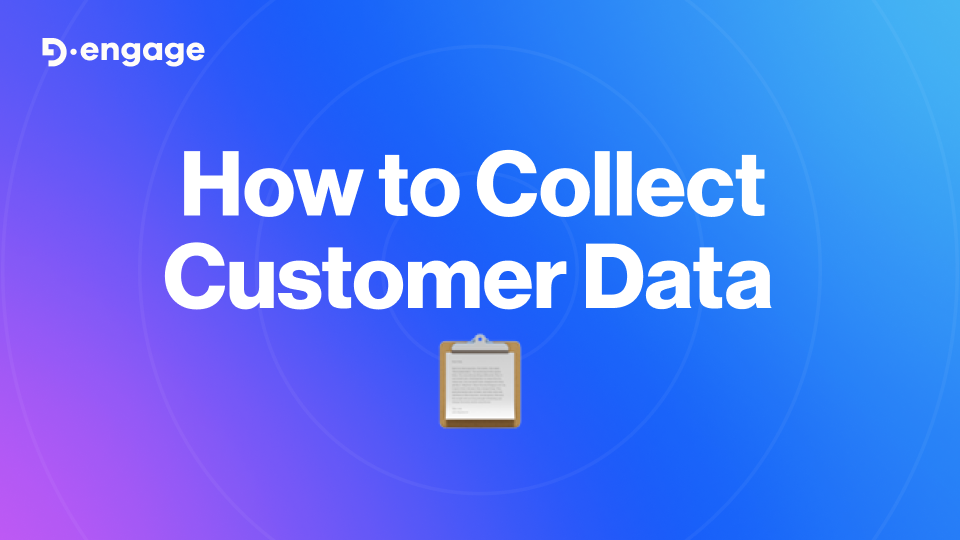Collecting customer data is crucial for businesses aiming to enhance their marketing strategies and improve customer relationships. As a SAAS software provider, Dengage offers cutting-edge digital marketing tools and data-driven insights to empower organizations. In this article, we’ll explore various methods to collect customer data, supported by industry analysis and statistics.
The Importance of Customer Data
Customer data provides invaluable insights that can help businesses personalize their offerings, improve customer satisfaction, and boost sales. Here’s why collecting customer data is essential:
- Personalization: Tailor marketing efforts to individual preferences.
- Customer Retention: Improve customer loyalty through targeted communications.
- Market Insights: Understand customer behaviors and trends.
- Operational Efficiency: Streamline operations based on data-driven decisions.
- Competitive Advantage: Stay ahead of competitors by leveraging insights.
Effective Methods to Collect Customer Data
1. Surveys and Feedback Forms
Surveys and feedback forms are straightforward ways to gather customer opinions and preferences.
- Online Surveys: Use platforms like SurveyMonkey or Google Forms to collect data online.
- In-Store Surveys: Offer digital or paper surveys at physical locations.
“According to Business News Daily, 89% of companies believe that customer feedback is crucial for understanding customer needs.”
2. Website Analytics
Analyze user behavior on your website to gain insights into customer preferences and pain points.
- Google Analytics: Track visitor behavior, page views, and conversion rates.
- Heatmaps: Tools like Hotjar show where users click and scroll on your site.
3. Social Media Monitoring
Monitor social media interactions to understand customer sentiments and trends.
- Social Listening Tools: Platforms like Hootsuite or Sprout Social help track brand mentions and customer feedback.
“Social media data collection can improve marketing effectiveness by up to 40%” – Nutshell
4. Customer Relationship Management (CRM) Systems
Use CRM systems to store and analyze customer data, enhancing personalization and communication.
- CRM Software: Solutions like Salesforce or HubSpot provide comprehensive data management.
5. Transactional Data
Analyze purchase histories to identify buying patterns and preferences.
- Point-of-Sale Systems: Collect data directly from sales transactions.
- E-commerce Platforms: Gather insights from online purchases.
“Transactional data can increase sales forecasting accuracy by up to 20%” – The CX Lead
Advanced Data Collection Techniques
1. Customer Loyalty Programs
Implement loyalty programs to gather data on repeat customers.
- Loyalty Cards: Track purchases and reward customer loyalty.
- Mobile Apps: Use apps to offer rewards and collect data.
“Companies with loyalty programs grow revenues 2.5 times faster than their competitors” – WordStream
2. Email Marketing Campaigns
Use email campaigns to gather data through interactions and engagement metrics.
- Email Surveys: Include surveys in email newsletters.
- Click-Through Rates: Track links clicked in emails for insights.
3. Mobile Data Collection
Leverage mobile devices to collect data through apps and SMS campaigns.
- Mobile Apps: Collect data through app interactions and usage patterns.
- SMS Campaigns: Use SMS surveys to gather quick feedback.
4. Behavioral Tracking
Track customer behavior across multiple channels to create comprehensive profiles.
- Cross-Channel Analytics: Integrate data from web, mobile, and in-store interactions.
- Behavioral Segmentation: Segment customers based on their behaviors for targeted marketing.
“Behavioral data collection can increase marketing ROI by up to 30%” – The Ecomm Manager
Best Practices for Ethical Data Collection
Transparency and Consent
- Clear Communication: Inform customers about data collection practices.
- Opt-In Mechanisms: Ensure customers opt-in to data collection.
Data Security
- Encryption: Protect data with robust encryption methods.
- Compliance: Adhere to regulations like GDPR and CCPA.
Data Quality
- Accuracy: Ensure data is accurate and up-to-date.
- Relevance: Collect only the data that is necessary for your business purposes.
Customer Trust
- Privacy Policies: Maintain transparent privacy policies.
- Data Usage: Use data responsibly and ethically to build customer trust.
“Maintaining customer trust can improve retention rates by up to 20%” – CGInfinity
Industry Insights and Statistics
According to Gartner, 91% of marketers believe that successful brands use customer data to drive their marketing decisions.
A report by Qualtrics found that 73% of customers expect personalized experiences.
Research by Forrester indicates that companies leveraging data for customer insights achieve a 20% increase in sales.
According to McKinsey, businesses with effective data collection and utilization strategies see a 15% increase in customer loyalty.
Harvard Business Review reports that data-driven organizations are 23 times more likely to acquire customers.
Conclusion
Collecting customer data is essential for businesses looking to enhance their marketing strategies and improve customer experiences. By leveraging surveys, website analytics, social media monitoring, CRM systems, and advanced techniques like loyalty programs and behavioral tracking, businesses can gain valuable insights into customer preferences and behaviors.
At Dengage, we offer comprehensive solutions to help businesses collect, analyze, and utilize customer data effectively. Our platform supports real-time analytics, personalized marketing automation, and ethical data practices, ensuring that your customer interactions are both meaningful and compliant.
Embrace the power of data to drive your business forward and create exceptional customer experiences.
